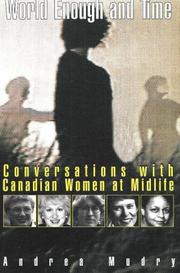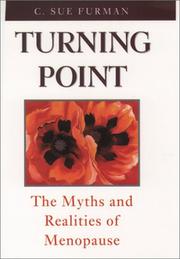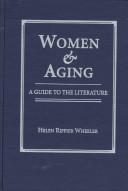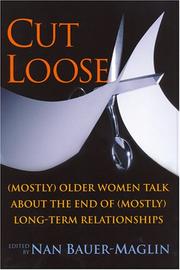| Listing 1 - 10 of 21 | << page >> |
Sort by
|

ISBN: 1554883830 9786611962548 1281962546 9781554883837 1550022687 9781550022681 6611962549 9781281962546 Year: 1996 Publisher: Toronto, Ontario ; Oxford, England : Dundurn Press,
Abstract | Keywords | Export | Availability | Bookmark
 Loading...
Loading...Choose an application
- Reference Manager
- EndNote
- RefWorks (Direct export to RefWorks)
Middle-aged women --- Older women (Middle-aged women) --- Middle-aged persons --- Women

ISBN: 9786610529476 1423736796 0195354303 1602561958 9781423736790 1280529474 9781280529474 0195113845 0195087739 9780195087734 9780195354300 9780195113846 Year: 1995 Publisher: New York Oxford University Press
Abstract | Keywords | Export | Availability | Bookmark
 Loading...
Loading...Choose an application
- Reference Manager
- EndNote
- RefWorks (Direct export to RefWorks)
The menopause has become a major health issue and women are demanding more information. This book explains the biology of the menopause in straightforward everyday terms and offers women a clear picture of the process, symptoms and treatments.
Menopause --- Popular works. --- Middle-aged women --- Health and hygiene.
Book
ISBN: 9798400683497 9798216115465 1440874727 Year: 2019 Publisher: New York : Praeger, Bloomsbury Publishing (US),
Abstract | Keywords | Export | Availability | Bookmark
 Loading...
Loading...Choose an application
- Reference Manager
- EndNote
- RefWorks (Direct export to RefWorks)
Interviews with and case studies of women in the U.S., accompanied by research in this text, show how our perceptions, thoughts, and spiritual practices can help women through menopause without drugs and their potential side effects. More and more women today are seeking natural ways to cope with menopause, including through mindfulness techniques and Eastern practices such as meditation. Women of various races, ages, and socioeconomic status interviewed at length for this study explain their experiences, victories, and setbacks in their quests to overcome this natural but body- and brain-altering change. Complementing findings from her research with wider outside research, author Deborah Merrill explains how popular culture depictions, race, class, and education all alter women's perceptions of the meaning of menopause, and how those perceptions can complicate, exacerbate, or alleviate physical and psychological symptoms. She details the "medical view" that views menopause as a problem to be solved, rather than as a natural event. And, through women's words and case studies, she details psychospiritual approaches many are adopting to cope, instead of seeking potentially harmful medicines. Readers will find new insights, wisdom, and potential solutions in the array of voices, experiences, and paths taken and presented in this book.
Life change events. --- Middle-aged women --- Menopause --- Attitudes. --- Psychological aspects.
Book
ISBN: 0791477266 1441607722 9781441607720 9780791477267 079147657X 9780791476574 Year: 2009 Publisher: Albany SUNY Press
Abstract | Keywords | Export | Availability | Bookmark
 Loading...
Loading...Choose an application
- Reference Manager
- EndNote
- RefWorks (Direct export to RefWorks)
Aging by the Book offers an innovative look at the ways in which middle age, which for centuries had been considered the prime of life, was transformed during the Victorian era into a period of decline. Single women were nearing middle age at thirty, and mothers in their forties were expected to become sexless; meanwhile, fortyish men anguished over whether their "time for love had gone by." Looking at well-known novels of the period, as well as advertisements, cartoons, and medical and advice manuals, Kay Heath uncovers how this ideology of decline permeated a changing culture. Aging by the Book unmasks and confronts midlife anxiety by examining its origins, demonstrating that our current negative attitude toward midlife springs from Victorian roots, and arguing that only when we understand the culturally constructed nature of age can we expose its ubiquitous and stealthy influence.
Middle-aged women --- Older women (Middle-aged women) --- Middle-aged persons --- Women --- Attitudes. --- Social conditions. --- Great Britain --- History --- Social life and customs

ISBN: 0585127727 9780585127729 1555876617 Year: 2022 Publisher: Boulder
Abstract | Keywords | Export | Availability | Bookmark
 Loading...
Loading...Choose an application
- Reference Manager
- EndNote
- RefWorks (Direct export to RefWorks)
More than two thousand bibliographic entries and extensive cross-references make Women and Aging: A Guide to the Literature a valuable resource for anyone interested in women’s studies, gerontology, and related subjects. A notable feature of the guide is its inclusion of journal articles, book chapters, essays, and doctoral dissertations, as well as complete books. All book entries are annotated. Information regarding specific definitions, the relevance of topics, and related research interests is interspersed throughout. Each of the thirteen chapters begins with a list of topics covered, followed by the entries themselves organized alphabetically within each topic. An introductory chapter includes a helpful "How-to," while the concluding chapter provides guidance in researching the field. In-depth subject and author indexes allow the user to identify specific areas of interest quickly and easily.
Older women --- Middle-aged women --- Gerontology --- Social sciences --- Geriatrics --- Older people --- Older women (Middle-aged women) --- Middle-aged persons --- Women --- Aged women
Book
ISBN: 1628952938 1609175239 9781609175238 9781611862416 1611862418 Year: 2017 Publisher: East Lansing
Abstract | Keywords | Export | Availability | Bookmark
 Loading...
Loading...Choose an application
- Reference Manager
- EndNote
- RefWorks (Direct export to RefWorks)
Revenge --- Murderers --- Middle-aged women --- Fugitives from justice --- Triangles (Interpersonal relations) --- Upper Peninsula (Mich.)

ISBN: 0874176689 9780874176681 087417659X 9780874176599 0874176727 9780874176728 Year: 2006 Publisher: Reno : University of Nevada Press,
Abstract | Keywords | Export | Availability | Bookmark
 Loading...
Loading...Choose an application
- Reference Manager
- EndNote
- RefWorks (Direct export to RefWorks)
Parents --- Chocolate --- Sex (Psychology) --- Pleasure. --- Divorced women --- Middle aged women --- Cocoa products --- Cooking (Chocolate) --- Psychology, Sexual --- Sex --- Sexual behavior, Psychology of --- Sexual psychology --- Sensuality --- Emotions --- Ethics --- Senses and sensation --- Utilitarianism --- Happiness --- Hedonism --- Divorcees --- Ex-wives --- Former wives --- Displaced homemakers --- Divorced people --- Single women --- Older women (Middle-aged women) --- Middle-aged persons --- Women --- Death --- Psychological aspects. --- Psychological aspects --- Frueh, Joanna. --- Middle-aged women

ISBN: 0387463410 0387463402 1441942807 Year: 2007 Publisher: New York : Springer,
Abstract | Keywords | Export | Availability | Bookmark
 Loading...
Loading...Choose an application
- Reference Manager
- EndNote
- RefWorks (Direct export to RefWorks)
A woman’s middle age had traditionally been regarded as a time of loss and decline. But in the wake of the women's movement and other societal and cultural events, a profound shift has taken place. Far from being marginalized, midlife women stand at the forefront of a great transformation of cultural perceptions and attitudes. They are rejecting stereotypes, embracing new opportunities, and forming what this important book terms "a new collective middle-aged identity." Women over 50: Psychological Perspectives analyzes the challenges, benefits, coping strategies, problems, and accomplishments associated with the midlife experience. Ten chapters present the state of research (and correct longstanding myths) regarding significant aspects of middle-aged women's lives: Mind-body: illness, body image, exercise Love, romance, and sexuality Friendship and support systems "The sandwich generation" Re-creating the role of grandmothers Retirement and financial stability Using personal empowerment to empower others Quality of life and future directions Women over 50 bridges a major knowledge gap in the feminist-psychology literature, making it an essential resource for clinicians and advanced students. It balances optimism and realism about older women’s lives—and younger women’s futures.
Middle-aged women. --- Middle-aged women --- Middle age. --- Psychology. --- Mid-life --- Midlife --- Adulthood --- Older women (Middle-aged women) --- Middle-aged persons --- Women --- Psychology, clinical. --- Consciousness. --- Sociology. --- Developmental psychology. --- Sexual behavior. --- Geriatrics. --- Clinical Psychology. --- Personality and Social Psychology. --- Gender Studies. --- Sexual Behavior. --- Geriatrics/Gerontology. --- Medicine --- Gerontology --- Older people --- Development (Psychology) --- Developmental psychobiology --- Psychology --- Life cycle, Human --- Social theory --- Social sciences --- Apperception --- Mind and body --- Perception --- Philosophy --- Spirit --- Self --- Diseases --- Health and hygiene
Book
ISBN: 1282300547 9786612300547 1576757935 9781576757932 9781605094205 160509420X 9781282300545 9781576755594 1576755592 661230054X Year: 2008 Publisher: San Francisco, CA : Berrett-Koehler Publishers,
Abstract | Keywords | Export | Availability | Bookmark
 Loading...
Loading...Choose an application
- Reference Manager
- EndNote
- RefWorks (Direct export to RefWorks)
Helps professional women experiencing feelings of disempowerment and dissatisfaction regain the confidence, courage, and energy to take control of their livesIdentifies 12 crises professional women face today and offers specific advice and tools for overcoming themDraws on interviews with over one hundred women, offering inspiring stories and practical advice for addressing and resolving disempowermentThousands of professional women, though outwardly successful, find themselves in the midst of a crisis, believing that they've sacrificed meaning, fulfillment, and balance in their lives to achie
Midlife crisis. --- Middle-aged women --- Women in the professions. --- Professions --- Crisis, Middle age --- Crisis, Midlife --- Mid-life crisis --- Middle age crisis --- Middle age --- Psychology. --- Psychological aspects

ISBN: 1283629194 9786613941640 0813561868 9780813561868 0813538467 9780813538464 0813538475 9780813538471 9781283629195 6613941646 Year: 2006 Publisher: New Brunswick, N.J. : Rutgers University Press,
Abstract | Keywords | Export | Availability | Bookmark
 Loading...
Loading...Choose an application
- Reference Manager
- EndNote
- RefWorks (Direct export to RefWorks)
Although breakups-whether celebrity or everyday-are a constant source of fascination, surprisingly little attention has been given to women who are cut loose in their later years. This is a book about (mostly) long-term relationships that have come apart. Each woman involved, the majority of whom are over sixty, tells of her experience through journal entries, essays, poetry, or stories. Although in many senses they have been abandoned, they have also been set free, untethered, and, for some, liberated sexually, mentally, or emotionally. The book is divided into two major sections. The pieces in the first part are personal narratives. Among the varied voices, we hear from women in both heterosexual and same-sex relationships who have been left by their partners or who have decided to leave them. In the second section, the contributors look at being left and leaving from psychological, sociological, economic, sexual, medical, anthropological, and literary perspectives. Other essays explore the shared experiences of specific classes of women, such as single women, widows, or abandoned daughters.
Middle-aged women --- Women --- Man-woman relationships --- Separation (Psychology) --- Older women (Middle-aged women) --- Middle-aged persons --- Human females --- Wimmin --- Woman --- Womon --- Womyn --- Females --- Human beings --- Femininity --- Breaking up (Interpersonal relations) --- Loss of loved one by separation --- Love loss (Psychology) --- Farewells --- Interpersonal relations --- Intimacy (Psychology) --- Loss (Psychology) --- Psychology
| Listing 1 - 10 of 21 | << page >> |
Sort by
|

 Search
Search Feedback
Feedback About UniCat
About UniCat  Help
Help News
News